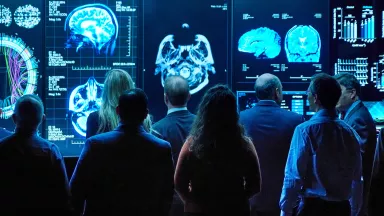Seizures & Epilepsy
Epilepsies are chronic neurological disorders in which clusters of nerve cells, or neurons, in the brain, sometimes signal abnormally and cause seizures. Neurons normally generate electrical and chemical signals that act on other neurons, glands, and muscles to produce human thoughts, feelings, and actions.
During a seizure, many neurons fire (signal) at the same time—as many as 500 times per second, much faster than normal. This surge of excessive electrical activity happening at the same time causes involuntary movements, sensations, emotions, and behaviors and the temporary disturbance of normal neuronal activity may cause a loss of awareness.
Epilepsy can be considered a spectrum disorder because of its different causes, different seizure types, its ability to vary in severity and impact from person to person, and its range of coexisting conditions. There also are many different types of epilepsy, resulting from a variety of causes. Seizures are divided into two major categories: focal seizures and generalized seizures. However, there are many different types of seizures in each of these categories. In fact, doctors have described more than 30 types.
To learn more about how seizure disorders and epilepsies are diagnosed, as well as symptoms, risk factors and treatment plans, please visit the menu on the left. Education and a knowledgeable medical team can help you navigate a diagnosis, making it easier for individuals and their families to manage symptoms and maintain a healthy quality of life.




